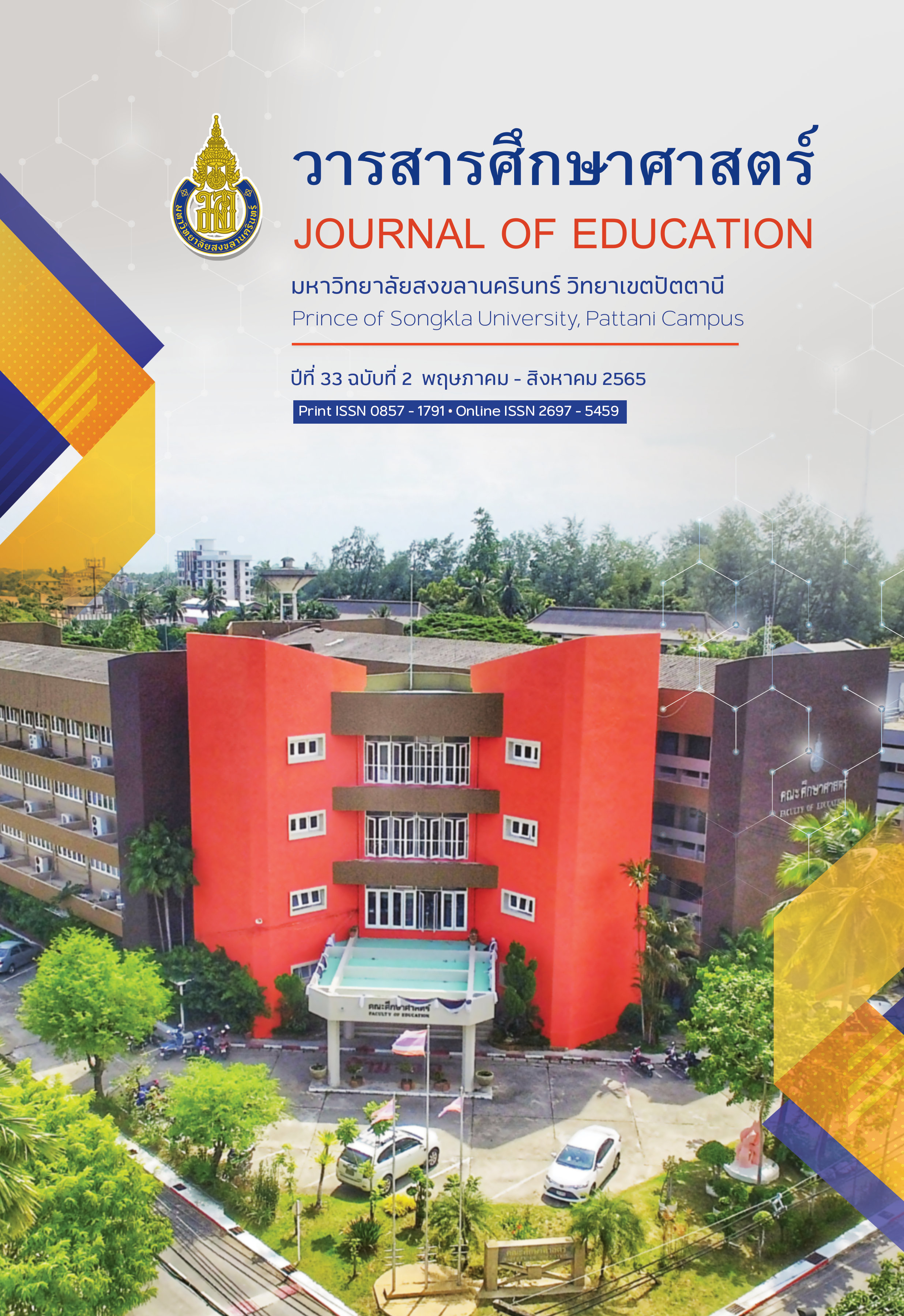การวิเคราะห์โมเดลสมการโครงสร้างแบบส่งผ่านพหุระดับของการทำงานร่วมกันของครูวิทยาศาสตร์ที่ส่งผลต่อการรู้เรื่องวิทยาศาสตร์ในระดับโรงเรียน
Main Article Content
บทคัดย่อ
การวิจัยนี้มีวัตถุประสงค์เพื่อ 1) เพื่อพัฒนาและตรวจสอบโมเดลสมการโครงสร้างระหว่างการทำงานร่วมกันของครูวิทยาศาสตร์ที่ส่งผลต่อการรู้เรื่องวิทยาศาสตร์ โดยมีความสนุกในการเรียนวิทยาศาสตร์และการพัฒนาวิชาชีพครูเป็นตัวแปรส่งผ่าน 2) เพื่อพัฒนาและตรวจสอบความตรงของโมเดลสมการโครงสร้างพหุระดับระหว่างการทำงานร่วมกันของครูวิทยาศาสตร์ที่ส่งผลต่อการรู้เรื่องวิทยาศาสตร์โดยมีความสนุกในการเรียนวิทยาศาสตร์ และการพัฒนาวิชาชีพครูเป็นตัวแปรส่งผ่าน ดำเนินการวิเคราะห์ด้วยข้อมูลทุติยภูมิชุดข้อมูล PISA 2015 ที่มุ่งวัดสมรรถนะของนักเรียนเกี่ยวกับการรู้เรื่องวิทยาศาสตร์ และตัวแปรที่มีความเกี่ยวข้องกับรายวิชาวิทยาศาสตร์ ความสนุกในการเรียนวิทยาศาสตร์ การพัฒนาวิชาชีพครู และการทำงานร่วมกันของครูวิทยาศาสตร์ โดยวิเคราะห์ข้อมูลตามวัตถุประสงค์ด้วยโปรแกรม Mplus 7.0
ผลการวิจัยพบว่า 1) การทำงานร่วมกันของครูวิทยาศาสตร์ส่งอิทธิพลทางตรงต่อการรู้วิทยาศาสตร์และตัวแปรอื่น ๆ ในทิศทางบวก และการทำงานร่วมกันของครูวิทยาศาสตร์ส่งอิทธิพลทางอ้อมต่อการรู้วิทยาศาสตร์ผ่านการพัฒนาวิชาชีพครูและความสนุกในการเรียนวิทยาศาสตร์ทั้งสองตัวแปรอย่างมีนัยสำคัญทางสถิติ นอกจากนั้นความสนุกในการเรียนวิทยาศาสตร์ส่งส่งอิทธิพลตรงในทิศทางลบต่อการรู้วิทยาศาสตร์อย่างมีนัยสำคัญทางสถิติ และการพัฒนาวิชาชีพครูส่งอิทธิพลตรงในทิศทางลบต่อการรู้วิทยาศาสตร์อย่างไม่มีนัยสำคัญทางสถิติ 2) การวิเคราะห์อิทธิพลของตัวแปรในระดับโรงเรียน พบว่า การทำงานร่วมกันของครูวิทยาศาสตร์ส่งอิทธิพลทางตรงต่อทุกตัวแปรในทิศทางบวกและส่งอิทธิพลทางอ้อมสองเส้นทางคือผ่านการพัฒนาวิชาชีพครูและความสนุกในการเรียนวิทยาศาสตร์อย่างมีนัยสำคัญทางสถิติ แต่ความสนุกในการเรียนวิทยาศาสตร์และการพัฒนาวิชาชีพครูส่งอิทธิพลตรงในทิศทางลบต่อการรู้วิทยาศาสตร์อย่างมีนัยสำคัญทางสถิติ
Article Details

อนุญาตภายใต้เงื่อนไข Creative Commons Attribution-NonCommercial 4.0 International License.
เอกสารอ้างอิง
Akiba, M., & Liang, G. (2016). Effects of teacher professional learning activities on student achievement growth. The journal of Educational Research, 109(1), 99-110.
Antoniou, P., & Kyriadides, L. (2013). A dynamic integrated approach to teacher professional development: Impact and sustainability of the effects on improving teacher behavior and student outcomes. Teaching and Teacher Education, 29, 1-12.
Areepattamannil, S., Freeman, J. G., & Klinger, D. A. (2010). Influence of motivation, self-beliefs, and instructional practices on science achievement of adolescents in Canada. Social Psychological Education, 14, 233-259.
Dash, S., Kramer, R. M., O’Dwyer, L. M., Masters, J., & Russell, M. (2012). Impact of online professional development or teacher quality and student achievement in fifth grade mathematics. Journal of Research on Technology in Education, 45(1), 1-26.
Hassan, G. (2008). Attitudes toward science among Australian tertiary and secondary school students. Research in Science & Technological Education, 26(2), 129-147.
Institute for the Promotion of Teaching Science and Technology. (2017). Summary of PISA Assessment 2015, Science, Reading and Mathematics. Bangkok: Institute for the Promotion of Teaching Science and Technology.
Johnson, C. C., Kahle, J. B., & Fargo, J. D. (2007). A study of the effect of sustained, whole-school professional development on student achievement in science. Journal of Research in Science Teaching, 44(6), 775-786.
Lin, Huann-shyang, Hong, Zuway-R., & Huang, Tai-Chu. (2012). The role of emotional factors in building public scientific literacy and engagement with science. International Journal of Science Education, 34(1), 25-42.
Lumpe, A., Czerniak, C., Harney, J., & Beltyukova, S. (2012). Beliefs about teaching science: the relationship between elementary teachers’ participation in professional development and student achievement. International Journal of Science Education, 34(2), 153-166.
Ronfeldt, M., Mcqueen, K., & Grissom, J. A. (2015). Teacher collaboration in instructional teams and student achievement. American Education Research Journal, 52(3), 475-514.


